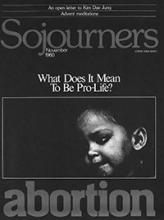The question of life is the question of the 20th century. Race and poverty are dimensions of the life question, but discussions about abortion have brought the issue into focus in a much sharper way. How we will respect and understand the nature of life itself is the overriding moral issue, not of the black race, but of the human race....
Some of the most dangerous arguments for abortion stem from popular judgments about life's ultimate meaning, but the logical conclusions of these positions are never pursued. Some people may unconsciously operate their lives as if pleasure is life's highest good, and pain and suffering the greatest enemy; whatever means are necessary should be used to prevent suffering and pain. My position is not to negate pleasure nor elevate suffering, but merely to argue against their being elevated to an ultimate end of life. Because if they are so elevated, anything, including murder and genocide, can be carried out in their name.
I am for family planning, but some sociologists argue for abortion as a means of birth control on the basis of shortages in housing, food, or space. I raise two issues at this point: 1) It is strange that they choose to start talking about population control at the same time that black people in America and people of color around the world are demanding their rightful place as human citizens and their rightful share of the material wealth of the world; and 2) People of color are for the most part powerless with regard to decisions made about population control. Given the history of people of color in the modern world, we have no reason to assume that whites are going to look out for our best interests.
Read the Full Article

